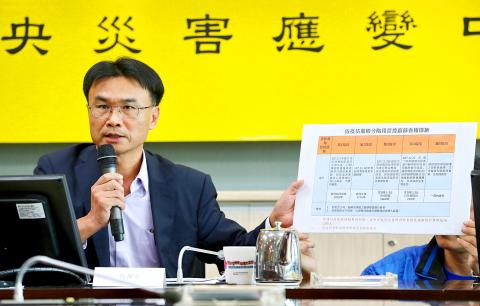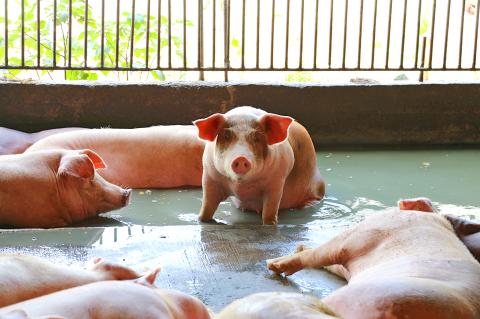Hog farms not regulated by environmental authorities must stop using leftovers as pig feed within a week, the Council of Agriculture (COA) said yesterday, adding that samples of another three pork products from China have tested positive for African swine fever after being seized by customs officials.
The council on Saturday said that it would not immediately ban the use of leftovers at all hog farms, but at yesterday’s third meeting of the Central Emergency Operation Center — which oversees measures to control the disease — said that it would restrict such operations.
Only farms on an Environmental Protection Administration (EPA) regulatory list would be allowed to continue feeding pigs leftovers, COA Acting Minister Chen Chi-chung (陳吉仲) said, adding that 357 farms were on the list.

Photo: CNA
The 1,155 hog farms that use leftovers but are not on the list must switch to commercial fodder, cease operations within a week or get EPA approval to use leftovers, COA Deputy Minister Huang Chin-cheng (黃金城) said.
Farms have to pass reviews of disinfection procedures for leftovers, as well as air and water pollution control facilities, before they can be placed on the list, EPA Bureau of Environmental Inspection Deputy Inspector-General Lin Jso-hsiang (林左祥) said, but adding that it is more difficult for smaller farms to pass the reviews.
The nation has about 7,230 hog farms and those using leftovers are mostly small-scale farms, Department of Animal Industry Deputy Director Wang Chung-shu (王忠恕) said.

Photo: Chiu Chih-jou, Taipei Times
Some farmers have planned a demonstration on Wednesday to protest the council’s disinclination to ban leftovers as pig feed, but the protest would be unnecessary, as the new rules would minimize the risk of transmission via leftovers, Huang said.
However, the council would continue to negotiate with the farmers, he said.
Meanwhile, three pork products from China seized at customs have tested positive for the African swine fever virus, bringing the number of such products to 10 since China reported its first infection in early August last year, he said.
The council on Dec. 18 increased fines for those found illegally importing pork products from areas affected by the disease to NT$200,000 (US$6,480) for first-time offenders and NT$1 million for repeat offenders, but customs officials had still intercepted 44 such products among 131 illegal meat imports as of Saturday, council data showed.
First-offense fines for non-pork meat products start from NT$10,000 if they are from areas without animal diseases and NT$30,000 if they are from areas with foot-and-mouth disease or bird flu.
Visitors of other nationalities, such as Vietnamese, have stopped trying to illegally import meat since the council increased the fines and boosted promotion of its policies, but Chinese visitors continue to do so, Huang said, adding that the trend is no longer attributable to insufficient information.
As cross-strait travel is expected to increase before and during the Lunar New Year holiday next month, the council would dispatch 20 more quarantine officials to ports in Kinmen County, as well as Taiwan Taoyuan International Airport and Kaohsiung International Airport, he said.
Meanwhile, a pig carcass found on Kinmen County’s Siaociou Islet (小坵島) on Friday yesterday tested negative for the disease, although another one found in the county on Monday last week tested positive, the council said.
Reports of dead animals on Taiwan proper have been increasing, but none have been confirmed to carry the virus, with some carcasses being dogs, it said.

MAKING WAVES: China’s maritime militia could become a nontraditional threat in war, clogging up shipping lanes to prevent US or Japanese intervention, a report said About 1,900 Chinese ships flying flags of convenience and fishing vessels that participated in China’s military exercises around Taiwan last month and in January have been listed for monitoring, Coast Guard Administration (CGA) Deputy Director-General Hsieh Ching-chin (謝慶欽) said yesterday. Following amendments to the Commercial Port Act (商港法) and the Law of Ships (船舶法) last month, the CGA can designate possible berthing areas or deny ports of call for vessels suspected of loitering around areas where undersea cables can be accessed, Oceans Affairs Council Minister Kuan Bi-ling (管碧玲) said. The list of suspected ships, originally 300, had risen to about 1,900 as

DAREDEVIL: Honnold said it had always been a dream of his to climb Taipei 101, while a Netflix producer said the skyscraper was ‘a real icon of this country’ US climber Alex Honnold yesterday took on Taiwan’s tallest building, becoming the first person to scale Taipei 101 without a rope, harness or safety net. Hundreds of spectators gathered at the base of the 101-story skyscraper to watch Honnold, 40, embark on his daredevil feat, which was also broadcast live on Netflix. Dressed in a red T-shirt and yellow custom-made climbing shoes, Honnold swiftly moved up the southeast face of the glass and steel building. At one point, he stepped onto a platform midway up to wave down at fans and onlookers who were taking photos. People watching from inside

Japan’s strategic alliance with the US would collapse if Tokyo were to turn away from a conflict in Taiwan, Japanese Prime Minister Sanae Takaichi said yesterday, but distanced herself from previous comments that suggested a possible military response in such an event. Takaichi expressed her latest views on a nationally broadcast TV program late on Monday, where an opposition party leader criticized her for igniting tensions with China with the earlier remarks. Ties between Japan and China have sunk to the worst level in years after Takaichi said in November that a hypothetical Chinese attack on Taiwan could bring about a Japanese

The WHO ignored early COVID-19 warnings from Taiwan, US Deputy Secretary of Health and Human Services Jim O’Neill said on Friday, as part of justification for Washington withdrawing from the global health body. US Secretary of State Marco Rubio on Thursday said that the US was pulling out of the UN agency, as it failed to fulfill its responsibilities during the COVID-19 pandemic. The WHO “ignored early COVID warnings from Taiwan in 2019 by pretending Taiwan did not exist, O’Neill wrote on X on Friday, Taiwan time. “It ignored rigorous science and promoted lockdowns.” The US will “continue international coordination on infectious